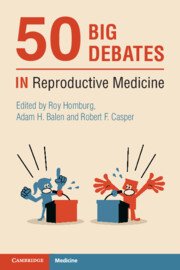Book contents
- 50 Big Debates in Reproductive Medicine
- Series page
- 50 Big Debates in Reproductive Medicine
- Copyright page
- Contents
- Contributors
- Foreword
- Introduction
- Section I Limits for IVF
- 1A Female Age 42 Years Should Be the Upper Limit for Conventional IVF/ICSI Treatment
- 1B Female Age 42 Years Should Be the Upper Limit for Conventional IVF/ICSI Treatment
- 2A Women with a BMI over 40 Should Be Refused Fertility Treatment
- 2B Women with a BMI over 40 Should Be Refused Fertility Treatment
- 3A Female Age of Menopause Is a Fair Limit for Ovum Donation
- 3B Female Age of Menopause Is a Fair Limit for Ovum Donation
- 4A Social Egg Freezing Should Be Available Up To the Age of 40 Years
- 4B Social Egg Freezing Should Be Available Up To the Age of 40 Years
- Section II IVF Add-ons
- Section III The Best Policy
- Section IV Embryology
- Section V Ethics and Statistics
- Section VI Male-factor Infertility
- Section VII Genetics
- Section VIII Ovarian Stimulation
- Section IX Hormones and the Environment
- Index
- References
1A - Female Age 42 Years Should Be the Upper Limit for Conventional IVF/ICSI Treatment
For
from Section I - Limits for IVF
Published online by Cambridge University Press: 25 November 2021
- 50 Big Debates in Reproductive Medicine
- Series page
- 50 Big Debates in Reproductive Medicine
- Copyright page
- Contents
- Contributors
- Foreword
- Introduction
- Section I Limits for IVF
- 1A Female Age 42 Years Should Be the Upper Limit for Conventional IVF/ICSI Treatment
- 1B Female Age 42 Years Should Be the Upper Limit for Conventional IVF/ICSI Treatment
- 2A Women with a BMI over 40 Should Be Refused Fertility Treatment
- 2B Women with a BMI over 40 Should Be Refused Fertility Treatment
- 3A Female Age of Menopause Is a Fair Limit for Ovum Donation
- 3B Female Age of Menopause Is a Fair Limit for Ovum Donation
- 4A Social Egg Freezing Should Be Available Up To the Age of 40 Years
- 4B Social Egg Freezing Should Be Available Up To the Age of 40 Years
- Section II IVF Add-ons
- Section III The Best Policy
- Section IV Embryology
- Section V Ethics and Statistics
- Section VI Male-factor Infertility
- Section VII Genetics
- Section VIII Ovarian Stimulation
- Section IX Hormones and the Environment
- Index
- References
Summary
The premise of this argument is that there is an appropriate age limit for conventional IVF/ICSI treatment. Why should there be a limit at all? It may be argued that as long as we can squeeze an egg out of an ovary and a woman wishes to proceed that should be enough for us to proceed. Good medical practice dictates that doctors advise patients with honesty and integrity and that might include advising no treatment – there is no compulsion to provide a patient with treatment on request or payment. For fertility specialists to fulfil every patient request whatever the ‘cost’ would class us alongside commercial surgery. If we are to argue that infertility is a medical diagnosis then we must not accept the definition of ‘industry’. There are a number of reasons why we might not accede to a request for IVF/ICSI in women past their 43rd birthday.
- Type
- Chapter
- Information
- 50 Big Debates in Reproductive Medicine , pp. 2 - 4Publisher: Cambridge University PressPrint publication year: 2021



